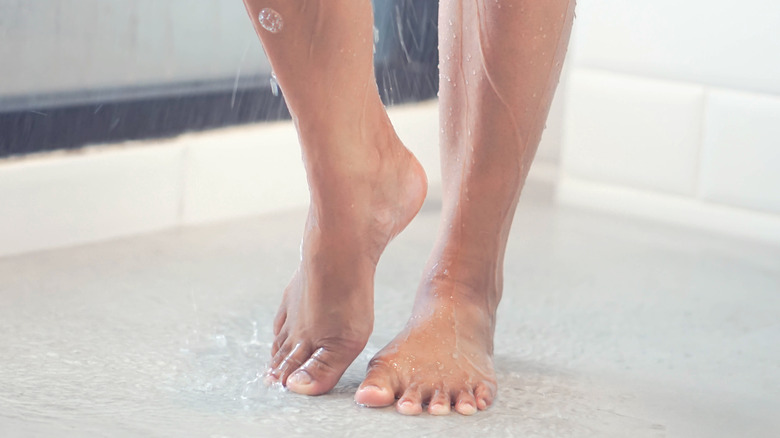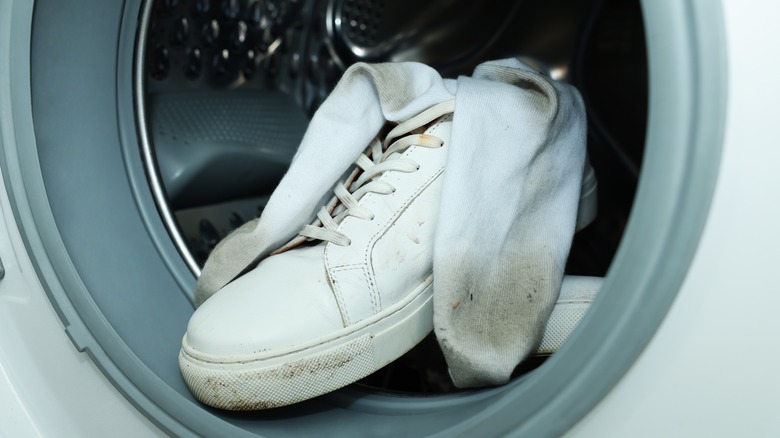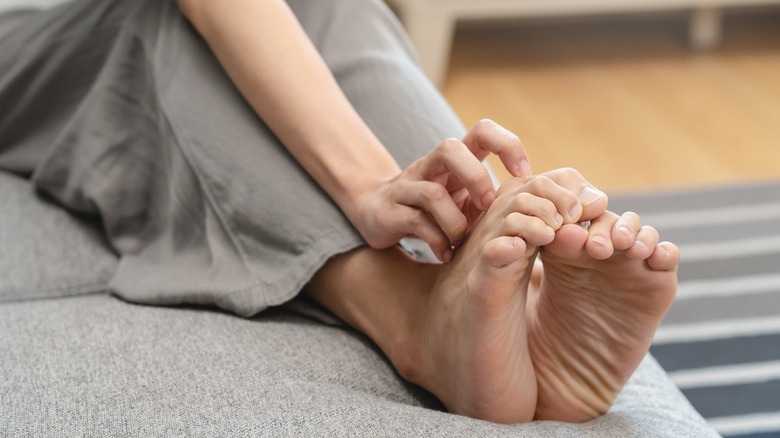What Really Happens When You Don't Wash Your Feet
While a hot, steamy shower can be a source of rest and relaxation, other times, it can feel a bit like a chore. You're standing there, mentally running through your hygiene to-do list, making sure you're hitting those not-to-miss spots: armpits, bellybutton, and that one body part you're probably missing. As the soap naturally runs down towards our feet and toes, it basically takes care of the cleaning for us, right?
On June 1, 2024, former American football player Jason Kelce rattled some social media users after replying to a post on X (formerly Twitter) that read, "Jason Kelce looks like he doesn't wash his legs or feet." Kelce's response? "What kind of weirdo washes their feet...." Naturally, this sparked a heated debate in the comments section between avid feet-washers and those who leave their toes untouched while bathing. Of course, this is a judgment-free zone here at Health Digest, but experts caution that not washing your feet on a regular basis can potentially have health implications.
You're potentially paving the way for smelly feet and calluses
Our body is covered in bacteria, and our feet are no exception. Thanks to the insulation of our socks and shoes, our feet serve as an optimal environment for bacteria to thrive in — and unfortunately, going sock-free in your shoes doesn't make things any better. "Bacteria [like] to feed on waste products that come out of your sweat glands, and they produce odor as they build up," Dr. Robert K. Lee of UCLA Medical Center, Santa Monica, told SELF. While your armpits might be the first area that comes to mind when you think of sweating, our feet give our underarms a run for their money. On the average day, our feet give off about ½ pint of sweat, thanks to their combined 250,000 sweat glands (via Patient). All that sweat is essentially an all-you-can-eat buffet for bacteria, increasing our risk for smelly feet.
Even if you're sticking your feet under the shower stream for a moment or two, water isn't enough to protect our feet from calluses. If you're not regularly washing and exfoliating your feet to help scrub away the buildup of dead skin, you may be more susceptible to calluses.
You may be more prone to infection if you don't wash your feet
Leaving your feet untouched by a bar of soap or a splash of body wash can also increase your risk of infection, particularly if you're someone who frequents public pools or communal gyms. Athlete's foot is one such fungal infection, which can lead to symptoms of itching, cracking, flaking, and scaly rashes (via SELF). Despite its name, however, athlete's foot doesn't only affect the feet. If you were to contract the infection, dry your feet with a towel after a shower, and then use that same towel to dry off the rest of your body, you could potentially spread the infection elsewhere. Another type of fungal infection, known as onychomycosis, can also develop if you continuously neglect your feet in the shower, explains Beauchamp Foot Care. Otherwise known as toenail fungus, this infection can cause toenails to become thick, misshapen, brittle, and yellow (via Mayo Clinic).
Alternatively, not washing our feet on a routine basis can also make a person vulnerable to plantar warts if human papillomavirus (HPV) were to make its way into the body through damaged skin on our feet.
People with diabetes may be more prone to foot ulcers
For patients with diabetes, foot hygiene is important to help prevent the development of foot ulcers. In a 2020 study published in Diabetes, Metabolic Syndrome and Obesity, researchers analyzed the foot hygiene practices of over 300 patients with diabetes and their history of foot ulcers. Most patients in the study reported that they examined and washed their feet once or more daily; others reported never drying between their toes after bathing, not using moisturizer on their feet, or not inspecting shoes prior to wearing them. The researchers emphasized the importance of foot hygiene education from healthcare providers to help protect patients with diabetes from foot ulcers.
To ensure we're getting our feet as squeaky clean as possible, the U.S. Centers for Disease Control and Prevention (CDC) suggests that we wash our feet daily, dry them thoroughly, keep our toenails short and clean, and reach for one or more fresh pairs of socks every day. After all, nobody like the feeling of damp, dirty socks plastered to their feet. Here's why staying in wet socks is worse for your health than you might think.




